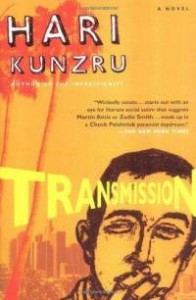 Light Satire From a Thin Story
Light Satire From a Thin Story
Kunzru, Hari (2004). Transmission. New York: Penguin.
Arjun Mehta is a computer nerd in India who is hired by a recruiting firm to work as a programmer in America, his life’s dream come true. He ends up at a software security firm in Seattle, testing for computer viruses. He is incredibly naïve and nerdy, which makes for some humorous observations about American life, especially in the software business. Arjun manages to befriend a tattooed, punky woman who works nearby at Microsoft. As is inevitable in the computer tech business, there are layoffs, and Arjun faces not only loss of job, but also of work visa, and the prospect of being sent back to his village in India in disgrace. So he writes a little virus, called “Leela,” and inserts it into the network, thinking he will later be the hero to discover and defeat it, thus proving his worth and saving his job. Instead, the virus goes out of control and spreads internationally, causing near collapse of financial, transportation, and other industries worldwide. Arjun goes on the run before the authorities figure out he was the perpetrator.
Meanwhile, two other stories are interwoven with Arjun’s basic tale. One is the story of a young, rich, egocentric, incompetent, self-blind, drug-fueled executive, Guy Swift, who runs a “brand management” startup. He babbles wonderful nonsense to clients about “total brand mutability” tracked with his proprietary “brand mutation maps” that lets customers “identify with the brand holistically.” It’s funny satire. Alas, Guy is unable to satisfy his venture capitalist funders when his computers are brought down by the Leela virus.
A third story line concerns a Bollywood film star named Leela, who is tormented by reporters who suspect the virus was a publicity stunt. She was Arjun’s favorite movie star, and he named the virus after her. He sends her a note to apologize, but that reveals his identity to the authorities, sending him into hiding. Leela’s story is the least interesting, providing a few jabs at easy targets like image-crazed producers, mob-backed financiers, and temperamental actors, but without the sharp satirical bite of the other two stories.
I find it unsatisfying when a novel lacks a strong, causally-driven story line running through the middle. Like many recent novels, this one ends by fading away. Did the authorities catch Arjun and hold him responsible for the virus? We never learn. There is no resolution of whatever dramatic tension had been built up.
The novel presents some engaging characters but the story goes nowhere. The result is some funny satirical bits but an unsatisfying experience overall.
